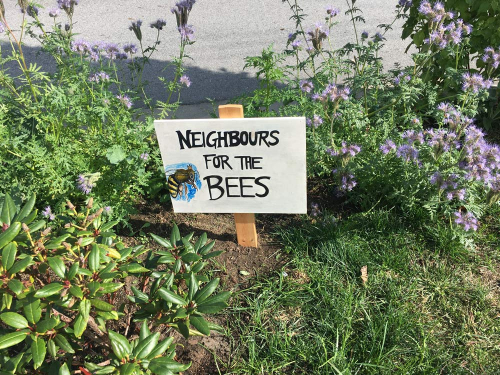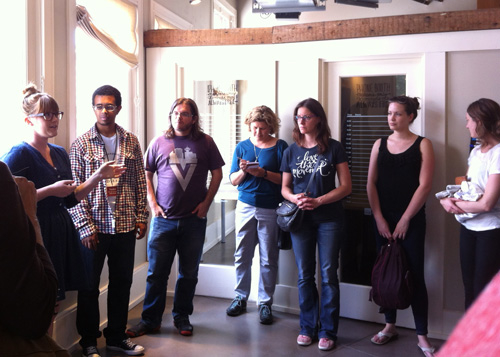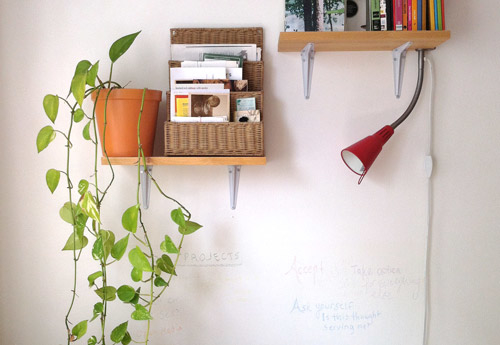Walk the Talk, Green Your City
I realised when I left Pecha Kucha (at the gorgeously renovated Queen Elizabeth Theatre), in a hurry to catch my 10:20 bus, that I don’t have enough conversations with people about sustainability. I attend events where the hundreds or thousands of people in the room/theatre all have a common interest, yet I go there to absorb information, chat with friends and promptly leave. I can’t blame all of that on living in the suburbs with a typically once-per-half-hour bus. But ultimately the result is that the information I gleaned and my opinions remain for the most part locked in my head and I lose the opportunity to learn from others in my community. (And Vancouver being a small city nurses an intimate though often disconnected one.)
Dialogue takes place frequently online, but in my experience it tends to be short and superficial and, while offering participation theoretically to anyone, the reality is that many voices are left out even within our own city. That’s where dialogue in person can facilitate those deeper connections that might not otherwise be made. It also lets us communicate visually. (And with that, check out RangiChangi Roots.) An event like Pecha Kucha is available to anyone with $10 and a couple hours to spare. It won’t reach everyone, but advertising in offline and particularly free media such as the Georgia Straight (I’m not sure whether it made it to street poles) pushes its reach outside of the—to some degree—exclusive online world. Over 2000 people attended Wednesday’s event, a specially-themed “Walk the Talk, Green Your City”, which is terrifically encouraging.
At Pecha Kucha or a similar event on sustainability issues, I think the question to be asked afterward is not a broad “What did you think?” or “Who was your favourite?” but rather a specific one like: “What did you think about the vision Dr. Robinson presented for UBC’s sustainable energy future?” Or, “Do you think David Ramslie’s social infrastructure concept will work on a broader scale?” Or, “Preet and Poonam’s reaction to the festival garbage led them to take initiative. Have you been surprised by a lack of concern for the environment at any events recently?” This strategy should stimulate a better discussion that will reveal people’s interests, knowledge, motives, wishes and actions.
What kind of conversations do you have? Are they fleeting or long and meaningful? Do you find yourself often in disagreement? What do you talk most about? Are these conversations mostly with people you know or don’t know? How many are with people from other countries or conducted in a language other than English? (I have managed to have two conversations in French about transportation issues.)
I was particularly inspired by Mayor Gregor Robertson, Preet Bal and Poonam Sandhu, Dr. John Robinson, David Ramslie and Ifny Lachance, for their spirited and impassioned presentations that were met with an uproar of approving applause, whoops and whistles. Their visions of safe, healthy communities with comprehensive recycling, biking facilities, bike lanes, reduced car usage, net zero waste and energy, and a stronger sense of unity rang true for much of the audience. It’s a beautiful vision without bordering on utopia, but the frustrating part is how long many of these initiatives have existed in other major cities (Amsterdam, Copenhagen, Stockholm) before us car addicts in North America have caught on. In some cases, we originally pioneered it then promptly forgot: as one presenter revealed, in the late 1970s Saskatchewan Conservation House (those of us that weren’t laughing at it being Saskwatchewan’s innovation were cheering) was a model for energy-efficient, self-sufficient buildings admired by Europeans. But, Canada had other priorities.
The City of Vancouver wants to hear your ideas on how to make Vancouver the greenest city by 2020 at talkgreentous.ca. (Do you think someone there received a Valentine’s Day card with David Suzuki saying “I love it when you talk green to me!”? If so, I want royalties.) I’m very impressed with the Dunsmuir bike lane design and can’t wait to see what comes out of their public idea gathering.
Tell me one thing YOU do, and one thing you think the City should do. We’re all ears. Then ask your friend or neighbour the same thing and see what conversations start growing.
Let me start it off: I buy from local food producers and farmers first. I’d like to see bike routes give priority to bikes at neighbourhood intersections by eliminating 4-way stop signs and applying 2-way stop signs to the cross-street traffic only.



